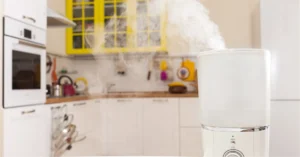An air ionizer can produce ozone. Ozone production is a common feature of air ionizers.
It is important to understand the potential health risks associated with ozone before using an air ionizer in a confined space.
The Basics Of Air Ionizers
What is an Air Ionizer?
An air ionizer is a device that helps to improve indoor air quality by releasing negatively charged ions into the air. These ions attach themselves to airborne particles like dust, allergens, and bacteria, making them too heavy to remain suspended in the air. As a result, these particles are effectively removed from the air, improving the overall air cleanliness.
How do Air Ionizers work?
Air ionizers work by generating negative ions using various methods such as corona discharge or radiation. These ions are then released into the air, where they interact with airborne particles. The negative charge of the ions neutralizes the positive charge of the particles, causing them to clump together or stick to surfaces like walls or furniture. This process is commonly referred to as air ionization or negative ionization.
Benefits of Air Ionizers
| 1. Improved air quality: | Air ionizers help to remove pollutants and allergens from the air, reducing the risk of respiratory issues and allergies. |
| 2. Odor reduction: | The negative ions generated by air ionizers can help to neutralize unpleasant odors in the air, leaving a fresher and cleaner environment. |
| 3. Mood enhancement: | Some studies suggest that negative ions can have a positive impact on mood and overall well-being, promoting relaxation and reducing stress levels. |
| 4. Increased energy: | Many people claim to experience increased alertness and energy levels in indoor environments with high levels of negative ions, similar to the refreshing feeling of being near a waterfall or after a thunderstorm. |
In summary, air ionizers work by releasing negatively charged ions into the air to improve air quality. They can help to remove pollutants, neutralize odors, enhance mood, and increase energy levels. However, it’s important to note that some air ionizers can also produce ozone as a byproduct, which may be harmful in high concentrations. Therefore, it is crucial to choose an air ionizer that is ozone-free or within safe ozone emission limits, especially for individuals with respiratory sensitivities.
Does Air Ionizer Produce Ozone?
Does Air Ionizer Produce Ozone?
When it comes to understanding ozone production, it’s essential to address the potential for air ionizers to produce ozone. While some air ionizers do emit ozone, it’s important to note that not all types do. Different types of air ionizers can vary in their ozone production:
| Type of Air Ionizer | Ozone Production |
|---|---|
| Negative Ion Generators | Minimal to no ozone production |
| Electrostatic Precipitators | Minimal to no ozone production |
| UV-C Germicidal Lamps | Potential for ozone production |
| Ozone Generators | Intentionally produce high levels of ozone |
| PCO (photo-catalytic oxidation) Ionizers | Potential for low to moderate ozone production |
Air ionizers that utilize negative ion generators or electrostatic precipitators typically produce minimal to no ozone. UV-C germicidal lamps and PCO ionizers may have some ozone production, although it is generally at lower levels. However, ozone generators intentionally produce high levels of ozone as their main function.
So, when choosing an air ionizer, it’s important to consider the specific type to determine its ozone production. Whether you opt for one that minimizes ozone production or one specifically designed for ozone generation, understanding the different types can help you make an informed decision for cleaner air.
The Controversy Surrounding Air Ionizers And Ozone
Air ionizers have been a subject of controversy due to their potential to produce ozone. Ozone is a gas that, at high levels, can have detrimental effects on health and safety. Many individuals are concerned about the impact of ozone generated by air ionizers in indoor environments.
Ozone can cause respiratory issues, such as throat irritation, coughing, and shortness of breath. Prolonged exposure to high concentrations of ozone can also lead to more severe health problems, like respiratory infection and lung damage. As a result, regulations and guidelines have been put in place to ensure safe levels of ozone in indoor air.
| Regulations and Guidelines for Ozone |
|---|
| Organizations such as the Environmental Protection Agency (EPA) provide regulations and guidelines for acceptable ozone levels in indoor air. |
| The American Lung Association also provides recommendations to limit ozone exposure and protect respiratory health. |
Research studies have been conducted to investigate the effects of ozone generated by air ionizers. Some studies suggest that high levels of ozone produced by these devices can pose health risks, while others indicate that the generated ozone remains within acceptable limits. These conflicting findings contribute to the ongoing debate surrounding air ionizers and their potential to produce ozone.
In conclusion, the controversy surrounding air ionizers and ozone stems from concerns about the impact of ozone on health and safety. Regulations and guidelines aim to mitigate the risks associated with ozone exposure, but research studies continue to provide conflicting findings. It is important for individuals to be aware of the potential risks and make informed decisions when using air ionizers in their indoor environments.

Credit: iuva.org
Understanding The Risks And Limitations
Does Air Ionizer Produce Ozone
Air ionizers are a popular choice for improving indoor air quality. However, it is important to understand the potential risks associated with their use. One concern is the production of ozone, a gas that can have harmful effects on human health. While ozone can freshen the air and remove odors, prolonged exposure to high levels of ozone can lead to respiratory issues, lung damage, and irritate the respiratory system. Identifying safe ozone levels is crucial to ensure the wellbeing of occupants. Factors such as ionizer design, settings, and room size can affect the amount of ozone produced. It is essential to choose an ionizer that meets safety standards and regulations and to follow manufacturer instructions for proper use. By understanding the potential health effects of ozone and the factors affecting ozone production, individuals can make informed decisions about whether to use air ionizers and how to use them safely.
Debunking Myths About Air Ionizers And Ozone
Myth: All Air Ionizers Produce Ozone
One common misconception is that all air ionizers produce ozone. While certain air ionizers do emit low levels of ozone as a byproduct, not all of them do. It’s crucial to distinguish between ionizers that generate ozone and those that strictly focus on ionization without any ozone production. Many modern air ionizers utilize different technologies that render them ozone-free, making them safe for everyday use.
Myth: Ozone is Always Harmful
Another myth surrounding ozone is that it is always harmful. While excessive exposure to high levels of ozone can indeed be harmful, low levels of ozone can have positive effects. In fact, ozone is often used in controlled environments to purify air and eliminate pollutants. The key lies in ensuring ozone levels are within safe limits and that proper precautions are taken to prevent any adverse health effects.
Myth: Ozone is Effective for Eliminating Airborne Germs
Sometimes, it is wrongly believed that ozone is a highly effective method for eliminating airborne germs. While ozone can help reduce certain odors and neutralize some bacteria and viruses, its efficacy in eliminating airborne germs is limited. Other technologies such as ultraviolet germicidal irradiation (UVGI) and high-efficiency particulate air (HEPA) filtration are more effective for this purpose.
Tips For Choosing An Air Ionizer
Does Air Ionizer Produce Ozone
When considering an air ionizer, it is important to choose the right type that suits your needs. Here are some tips to help you make an informed decision:
Choosing the Right Type of Ionizer:
- Consider the size of the space where the ionizer will be used. Different ionizers have different coverage areas, so choose one that is suitable for your room size.
- Decide between a standalone ionizer or one that is integrated into an air purifier. Standalone ionizers are portable and can be moved from room to room. On the other hand, integrated ionizers offer the convenience of combined air purification and ionization.
- Take into account the type of ions generated by the ionizer. Some ionizers produce positive ions, while others produce negative ions. Negative ionizers are generally preferred as they help to neutralize harmful particles in the air.
Features to Look for:
- Air quality sensors that detect the level of pollutants and adjust the ionization accordingly.
- An adjustable ion output setting that allows you to control the intensity of ionization.
- A timer function that allows you to schedule when the ionizer should operate.
Understanding Certifications and Standards:
When choosing an air ionizer, it is important to look for certifications and standards that guarantee its performance and safety. Look for certifications such as the California Air Resources Board (CARB) certification, which ensures compliance with strict ozone emission limits.
Frequently Asked Questions For Does Air Ionizer Produce Ozone
How Much Ozone Does Ionizer Produce?
Ionizers produce a small amount of ozone, but the exact quantity depends on the specific model.
Is It Safe To Breathe In Ionized Air?
Breathing in ionized air is generally safe. It helps to remove pollutants and allergens, making the air cleaner and fresher. However, some individuals may experience mild irritation or discomfort. It is recommended to follow manufacturer instructions and consider any personal sensitivities before using ionizers.
Is It Safe To Be In A Room With An Ionizer?
Yes, it is safe to be in a room with an ionizer. Ionizers produce negative ions that help purify the air by removing pollutants and allergens. However, prolonged exposure to high levels of ozone, a byproduct of some ionizers, may cause respiratory issues. Make sure to follow usage guidelines and maintain proper ventilation.
How Do I Know If My Ionizer Produces Ozone?
To determine if your ionizer produces ozone, check the product specifications or manual for ozone production details. Look for mentions of ozone generation or ozone output levels. You can also contact the manufacturer or seller for this information.
Conclusion
Air ionizers are a popular choice for improving indoor air quality. However, there is a concern about the production of ozone. While some air ionizers may produce low levels of ozone, it is important to choose a reputable brand that adheres to safety guidelines.
Understanding the potential risks and benefits of air ionizers can help make an informed decision for a clean and healthy home environment.




